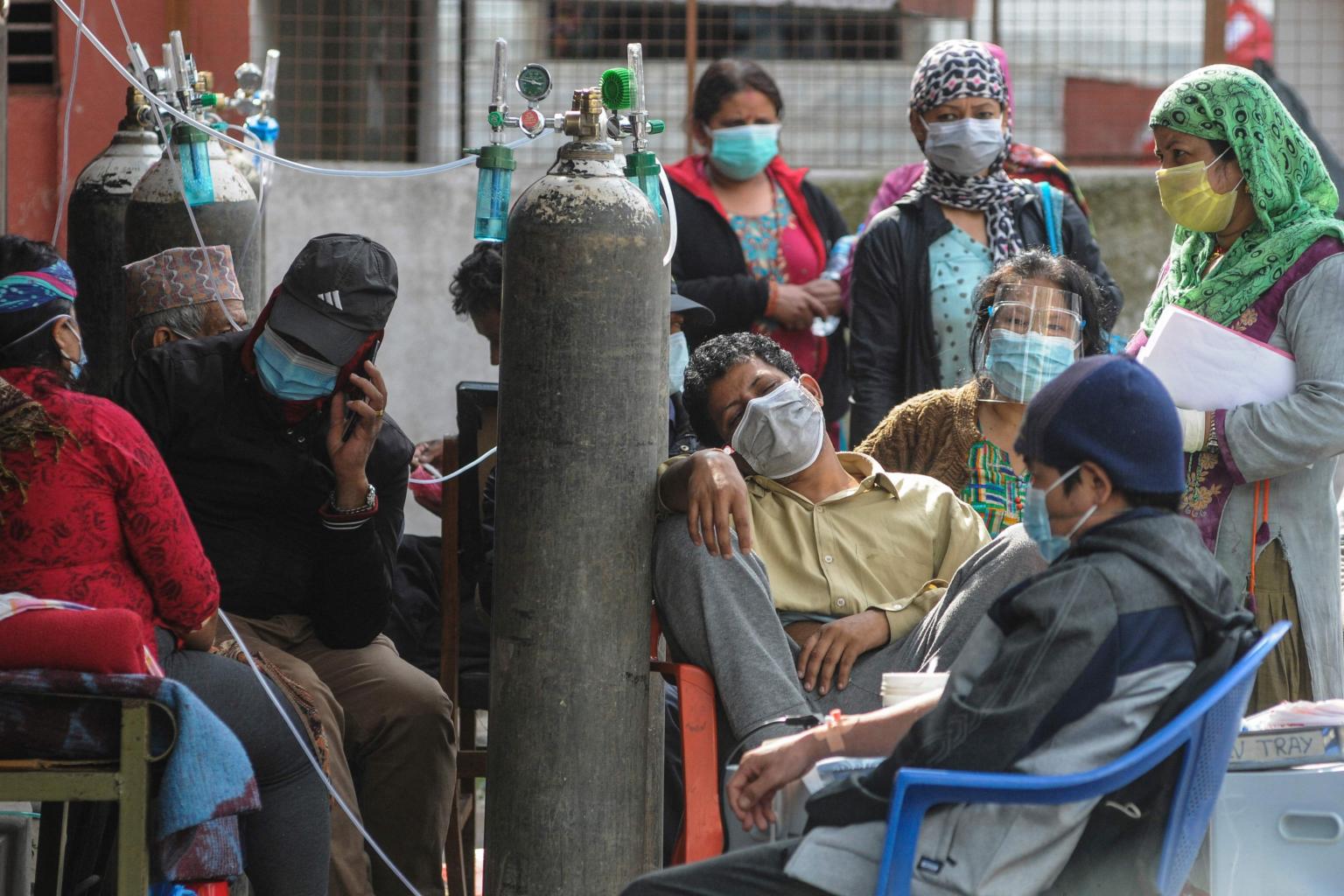Let down by the health system, Covid-19 patients in Nepal left to their own devices
Sign up now: Get insights on Asia's fast-moving developments

Covid-19 patients breathe with the help of medical oxygen outside an emergency ward in Kathmandu, on May 13, 2021.
PHOTO: AFP
KATHMANDU (THE KATHMANDU POST/ASIA NEWS NETWORK) - On Sunday (May 9), Mr Hukum Adhikari tested positive for Covid-19. Two days later, his wife also tested positive for the virus.
Mr Adhikari, 50, had fever and non-stop cough accompanied by body ache. The condition of his wife Sabitri, 45, was more serious as she had difficulty breathing.
"Luckily, one of my relatives arranged for an oxygen cylinder for us, so we didn't have to go to the hospital," said Mr Adhikari, a freelance researcher.
"I can't imagine how difficult things would have been if she had to be rushed to the hospital," said Mr Adhikari, a father of two grown-up sons, both of whom are abroad for higher studies.
When the Adhikari couple contracted the virus, both of them decided not to go to the hospital or inform the ward office about their infection.
Like the Adhikaris, Mr Anuj Thapa, 35, of Mahadevsthan, Koteshwar, is isolating himself at his relative's house after testing positive last week. "Since Sunday, I have been suffering from diarrhoea and vomiting besides other Covid-19 symptoms," said Mr Thapa.
He said he decided not to stay at home because he has a younger brother and sister-in-law, who got married just two weeks ago.
"Although we hadn't invited many people to the wedding, I guess I contracted the virus there. I am isolating at my relative's place to protect the new couple," said Mr Thapa. According to him, the new couple is fine.
Mr Thapa's sister is a nurse by profession and she has put him on a saline drip. "I felt dehydrated so she recommended this saline solution. We have decided not to go to the hospital unless it is absolutely necessary," Mr Thapa said.
The Adhikari couple and Mr Thapa represent the people who are tackling Covid-19 at home and not seeking medical help. And they have a reason not to.
With hospitals overwhelmed with Covid-19 patients and the country facing an acute shortage of oxygen and other medical supplies, many private hospitals over the past few days have published notices saying they cannot take in new patients.
Just last week, Kathmandu Mayor Bidya Sundar Shakya said the virus situation in Kathmandu is already out of control. The city appears awfully unprepared for the situation even though it has turned into the biggest Covid-19 hot spot in the country.
According to the Kathmandu Metropolitan City, a total of 7,626 Kathmandu residents were in home isolation as at Wednesday.
On Tuesday, the country reported its highest Covid-19 death toll of 225 and a record 9,317 cases.
The government's data shows that on Thursday, 214 people died of the virus and 8,842 tested positive.
Amid the government's inefficiency in handling the pandemic, private sector hospitals have also let the public down when they were most needed.
On Tuesday, Nepal Medical College published a notice telling its Covid-19 patients to get discharged from the hospital, owing to an acute shortage of oxygen. More than a dozen private hospitals in the Kathmandu Valley have come up with similar notices since, causing distress to patients and their families.
On Wednesday, the Dhapashi-based Grande International Hospital issued a notice saying it cannot take in new Covid-19 patients. Then, a group of hospitals including Medicare Hospital, Nepal Bharat Maitri Hospital, Dirghayu Hospital and Helping Hands Hospital published a joint notice stating that they will not admit new Covid-19 patients until the government provides them oxygen.
Other private hospitals such as Karuna Hospital, Himal Hospital, Om Hospital and Everest Hospital have also published similar notices.
Over the last few months, there had been reports of private hospitals charging high fees to Covid-19 patients in the name of "virus safety charges". Private hospitals have been charging Covid-19 patients between Rs 7,000 (S$79.70) and Rs 50,000 per day, rendering them unaffordable for people from low and middle-income groups.
"It's not possible to get beds at government hospitals, while the private hospitals overcharge and now they say they have run out of oxygen. The situation is really grim," said Mr Thapa, the Covid-19 patient from Koteshwor.
Meanwhile, Dr Sher Bahadur Pun, chief of the clinical research unit at Sukraraj Tropical and Infectious Disease Hospital in Teku, said many people with Covid-19 symptoms are so panicked by the current situation that they are not going for tests or to hospitals, and are relying on traditional remedies at home.
With the virus reaching almost all parts of Kathmandu Valley and the health system unable to handle the cases, Dr Pun fears more people could die without treatment.
"The elderly patients are at especially high risk, and many could die at home," said Dr Pun.


